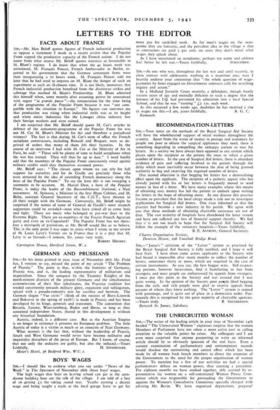LETTERS TO THE EDITOR FACTS ABOUT FRANCE
Sia,—Mr. Max Beloff quotes figures of French industrial production to oppose a statement I made, in a recent review that the Popular Front sapped the productive capacity of the French nation. I do not know from what source Mr. Beloff quotes statistics so favourable to M. Blum's regime. I do know that when the 40 hours week was introduced, M. Francois Poncet, French Ambassador in Berlin, re- ported to his government that the German armament firms were then inaugurating a 70 hours week. M. Francois Poncet told me later that he had tried to impress on M. Blum the danger of such an experiment at such an ill-chosen time. It is not likely, moreover, that French industrial production benefited from the disastrcus strikes and sabotage that marked M. Blum's Premiership. M. Blum admitted this himself when, some months after assuming power he announced with regret "la grande pause "—the renunciation for the rime being of the programme of the Popular Front because it was "not com- patible with the situation in Europe." No figures can convince me that production was rising when industrial strife was at its height and when entire industries like the Limoges china industry lost their foreign markets and were ruined.
I am surprised that Mr. Beloff should quote M. Cot's articles in defence of the armament-programme of the Popular Front for was not M. Cot M. Blum's Minister for Air and therefore a prejudiced witness? The fact is that during M. Cot's term of office the French aeroplane constructors, including Renault and Breguet, were so de- prived of orders that many of them left their factories. In the course of an interview I had with M. Cot at the Ministry of Air in Paris, he said: "There will be plenty of time to build aeroplanes when the war has started. They will thus be up to date." I need hardly add that the members of the Popular Front consistently voted against military credits until they themselves assumed power.
Mr. Beloff says: "The classes upon whom we can rely for full support for ourselves and for de Gaulle are precisely those who were attracted by the idea of extending French democracy along the lines of the Popular Front." To say the least this is too sweeping a statement to be accurate. M. Marcel Peat, a hero of the Popular Front, is today the leader of die Rassemblement National, a Nazi movement. M. Spinasse, a Minister in the first Blum Cabinet, and M. Belin, assistant General Secretary of the C.G.T., have thrown in all their weight with the Germans. Conversely, Mr. Beloff might be surprised if the names of some of General de Gaulle's most staunch supporters could be revealed—men who, have risked all to come here and fight. There are many who belonged in pre-war days to the Extreme Right. There are ex-members of the Fascist French Agrarian party and even an ex-Cagoulard! The Popular Front has not there- fore a monopoly of patriotism, as Mr. Beloff would like us to believe. This is the only point I was eager to stress when I wrote in my review of M. Louis Levy's Verites sur in France that it is a pity that M. Levy is so biassed.—I remain, Sir, yours very truly,






















 Previous page
Previous page